Shopify vs Weebly: Head-to-Head Showdown – Pricing, Features, and More
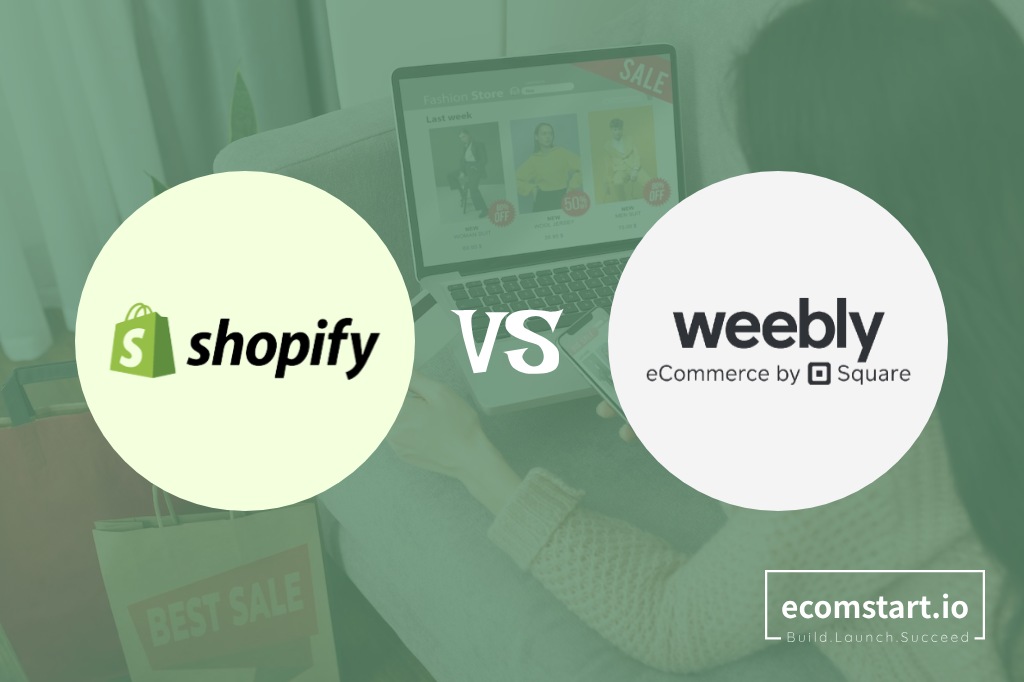
In the dynamic eCommerce field, choosing a suitable platform for your business store is the key to success. Without a doubt, Shopify and Weebly are the two prominent players in this game, each with its own competitive features.
This comprehensive comparison of Shopify vs Weebly will help you decide which is the best solution for boosting your store to the next level. We’ll cover critical factors, including cost, features, design, ease of use, integration, and scalability.
Let’s find out together the answer to the big question: Is Weebly or Shopify better for what you need?
1. Key differences at a glance: Weebly vs Shopify
| Shopify | Weebly | |
| Definition | All-in-one commerce platform for all-size businesses | Website builder and eCommerce platform focusing on professional and mobile-optimized sites |
| Rating | User-friendly, around 4.4/5 on average, according to Forbes Advisor | User-friendly, around 4.4/5 on average, according to Forbes Advisor |
| Pricing | Start for free, then $1/month for 3 months, after that: Pay monthly: – Basic: $25/month – Shopify: $65/month – Advanced: $399/month Pay yearly: saved 25%. | Pay monthly: – Free: $0/month – Personal: $10/month – Professional: $12/month – Performance: $26/month – Premium: $72/month Pay yearly: – Personal: $13/month – Professional: $16/month – Performance: $29/month – Premium: $79/month |
| Target Audience | Businesses of all sizes | Businesses of small to medium sizes |
| Design & Customization | Extensive options, great for flexibility | User-friendly, suitable for basic needs |
| Ease of Use | User-friendly, slight learning curve | Very beginner-friendly |
| eCommerce Features | Comprehensive, robust | Suitable for basic eCommerce needs |
| Marketing Tools | Advanced marketing features | Basic marketing tools included |
| Apps & Integrations | Extensive app store, wide integrations | Limited compared to Shopify |
| Scalability | Highly scalable, suitable for growth | Limited scalability for large businesses |
| Pros | Powerful features, scalability | User-friendly, cost-effective plans |
| Cons | Higher pricing, steeper learning curve | Limited scalability, fewer advanced features |
Shopify is an all-in-one eCommerce platform that allows you to set up, operate, and grow your businesses online, in-store, or anywhere. You can leverage its extensive online sales, marketing, and management tools. On the other hand, Weebly is a website builder with eCommerce capabilities for smaller businesses.
The main difference between Shopify vs Weebly is their focus and features. Shopify is made for robust eCommerce functionality with advanced tools, while Weebly is a user-friendly website builder for users with basic eCommerce features.
To sum up, Shopify is ideal for those who want a complete online store experience. Weebly will suit those who prioritize simplicity and ease of use to enhance their online presence.
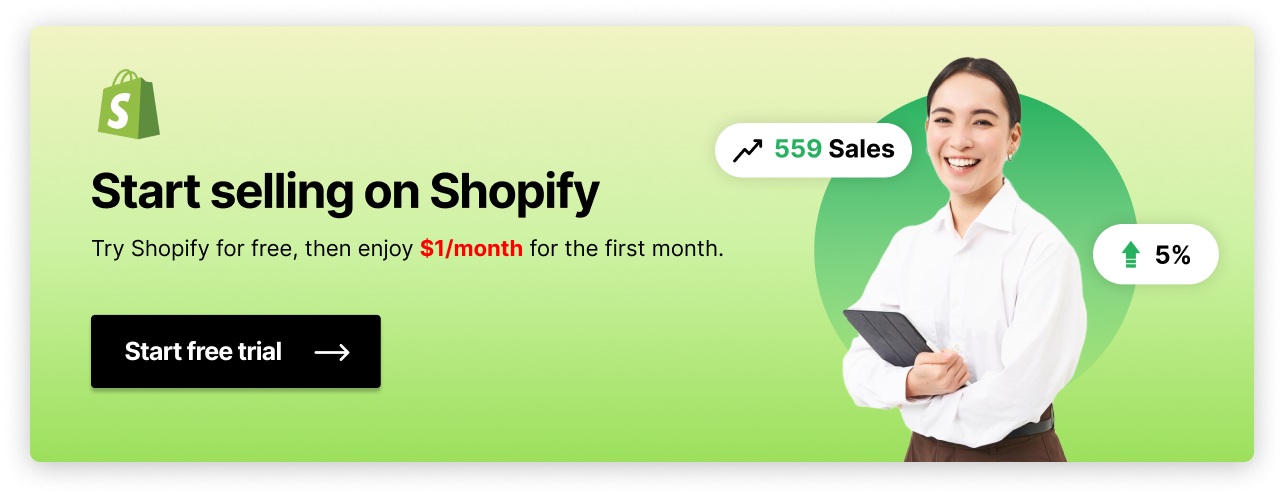
2. Shopify vs Weebly: A deep dive comparison
2.1. Pricing
| Pricing Criteria | Shopify | Weebly | |
| Free trial | Free trial for 3 days, no credit card required, then 1 $/month for the first 3 months | No free trial, but there’s a Free Package with basic use | |
| Pricing | Monthly bill | – Basic: $25/month – Shopify: $65/month – Advanced: $399/month | – Personal: $13/month – Professional: $16/month – Performance: $29/month – Premium: $79/month |
| Yearly bill | – Basic: $19/month – Shopify: $49/month – Advanced: $299/month | – Personal: $10/month – Professional: $12/month – Performance: $26/month – Premium: $72/month | |
| Transaction fees | None for using Shopify payment Third-party payment provider: – Basic: 2% – Shopify: 1% – Advanced: 0,5% | 2.9% + $0.3 per transaction fee for all payment methods | |
| Credit card fees | – Basic: 2.9% + $0.3 per transaction – Shopify: 2.6% + $0.3 per transaction – Advanced: 2.4% + $0.3 per transaction | 2.9% + $0.3 per transaction fee for all payment methods | |
Shopify plans
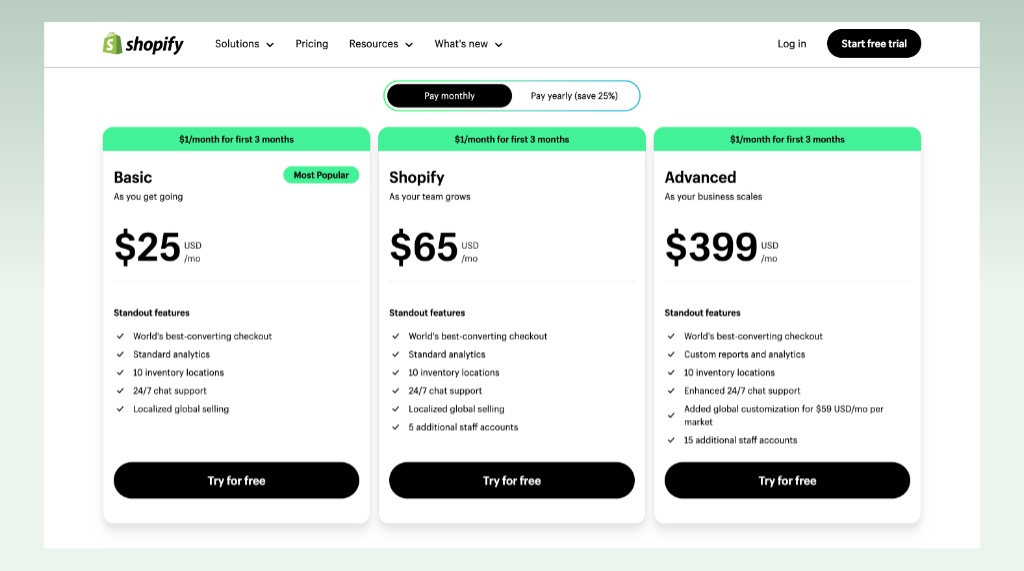
Weebly plans
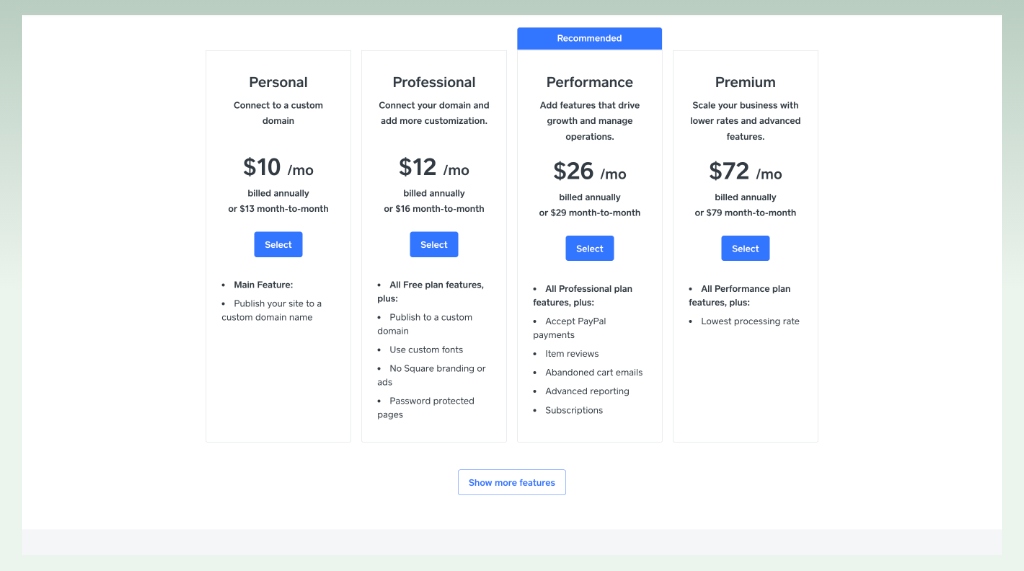
Shopify offers 3 plans: Basic, Shopify, and Advance, starting at $19 per month. There will be transaction fees when using third-party payment providers. You can choose the higher-tier plans to reduce transaction fees.
On the other hand, Weebly has more budget-friendly pricing, starting at $10 per month. However, its transaction fees are higher, up to 3%.
Our verdict: Weebly wins in affordability, especially for small businesses.
2.2. Design & customization
| Design & Customization Criteria | Shopify | Weebly |
| Design Features | 70+ mobile-friendly themes, categorized by industry, layout, and design styles. | Simple design features include around 50 free themes and 15 online store designs. |
| Template Variety | – Around 180 themes, with 12 free options. – Elegant, professional, and categorized templates for easy selection. | – Approximately 50 free themes, including 15 for online stores. – Standard customization for colors, fonts, and layouts. |
| Customization Options | Extensive customization options, allowing edits to fonts, colors, and theme code for advanced users. Third-party themes available. | Good customization options, allowing edits to colors, fonts, and layouts. Limited coding compatibility with third-party themes. |
| Mobile-Responsiveness | Automatically mobile-responsive themes for a seamless experience on smaller screens. | All themes are automatically mobile-responsive for a consistent look on different devices. |
| Cost of Themes | Both free and paid themes, with paid themes providing additional features and customization options. | Around 50 free themes. Paid themes are limited, and third-party coding may not be fully compatible. |
Shopify themes are more diverse and well-categorized:
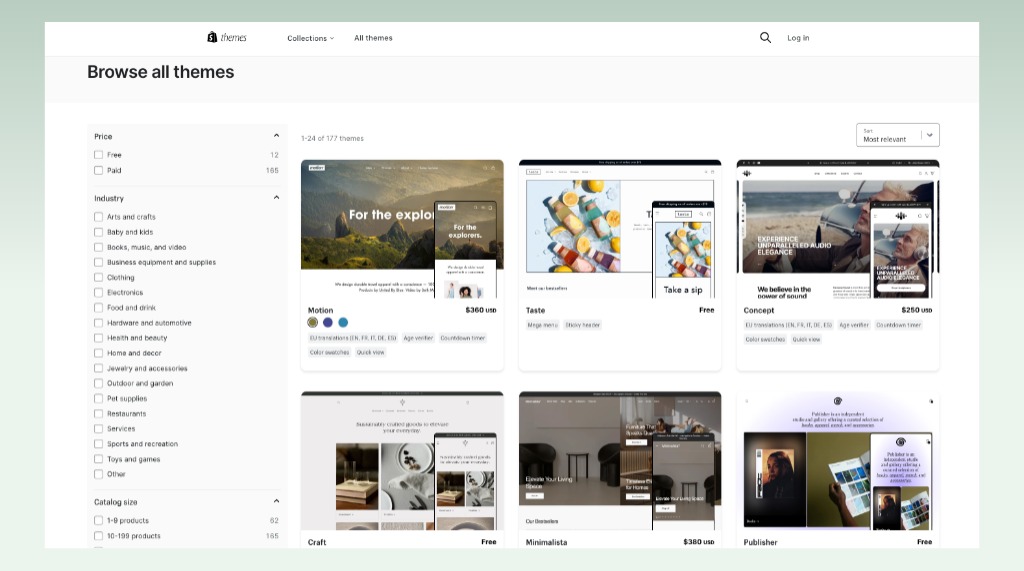
Weebly themes more focus on building websites and blogs:
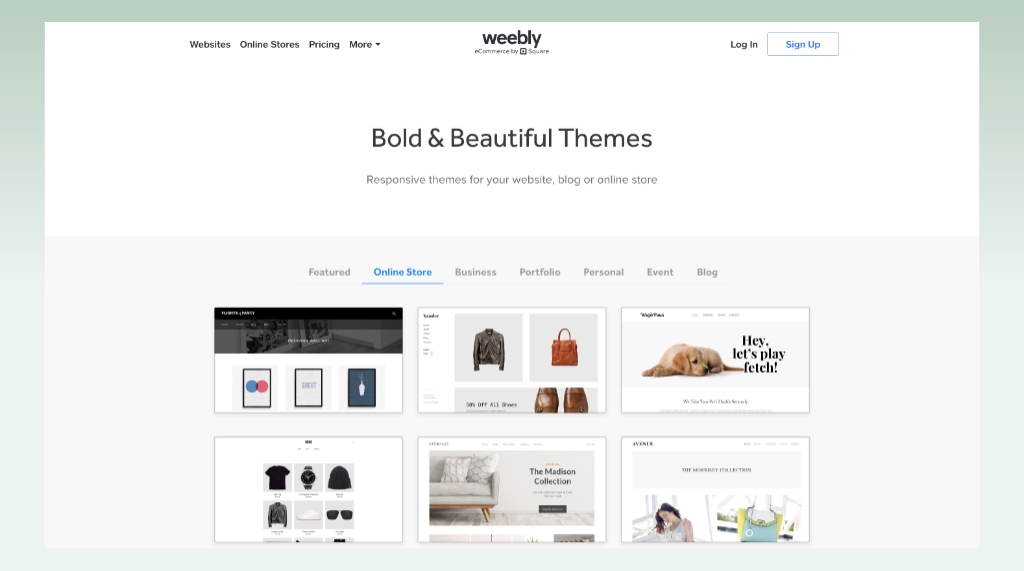
In general, Shopify and Weebly offer solid design and customization features, but Shopify takes the lead with more theme choices, advanced customization options, and professional design.
However, it’s important to consider budget, as Shopify themes often cost more, whereas Weebly is simpler and more affordable. So, if you have a tight budget or less complex design needs, Weebly is a suitable choice.
Our verdict: Shopify wins for advanced customization options.
2.3. Ease of use
| Ease of Use Criteria | Shopify | Weebly |
| Interface and Setup | – More structured onboarding process with in-depth guidance for building online stores. – More complex setup but provides comprehensive support. | – Simpler onboarding process, with pop-up tutorials in the editor. – Straightforward setup, suitable for beginners creating websites and online stores. |
| Design and Customization | Shopify’s drag-and-drop editor can be more complex but provides extensive customization for online stores. | Weebly’s drag-and-drop editor is simpler, offering intuitive customization for both websites and online stores. |
| Building and Running a Website | Shopify’s more complex setup facilitates the management of online stores, allowing separate tracking of inventory and orders. | Weebly’s straightforward editor is suitable for creating and updating sites, while its simple design may be advantageous for basic online stores. |
Shopify editor is more complex but allows you to customize your store in advanced and flexible:
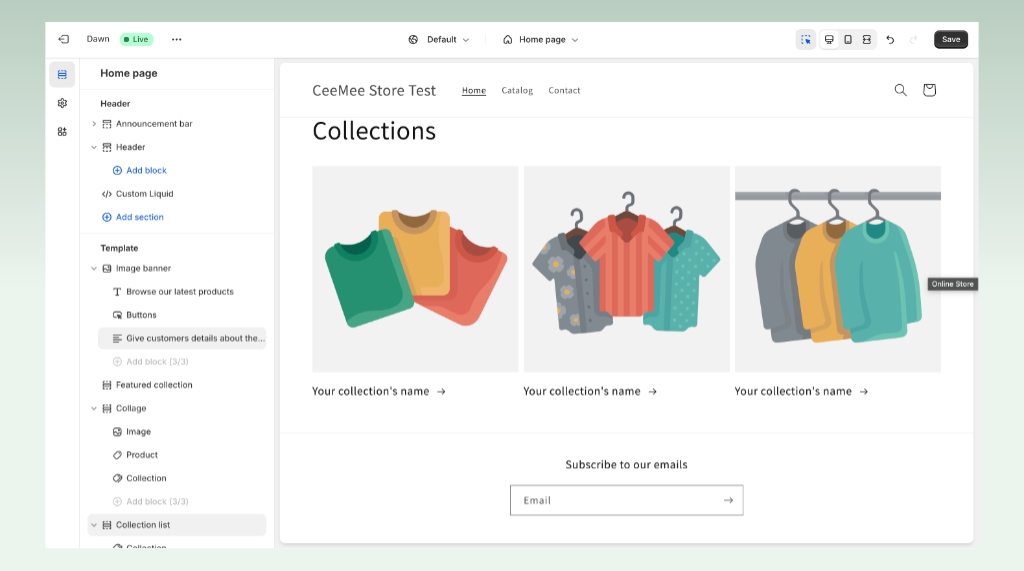
Weebly editor interface is much simpler, allowing you to build both websites and online stores:
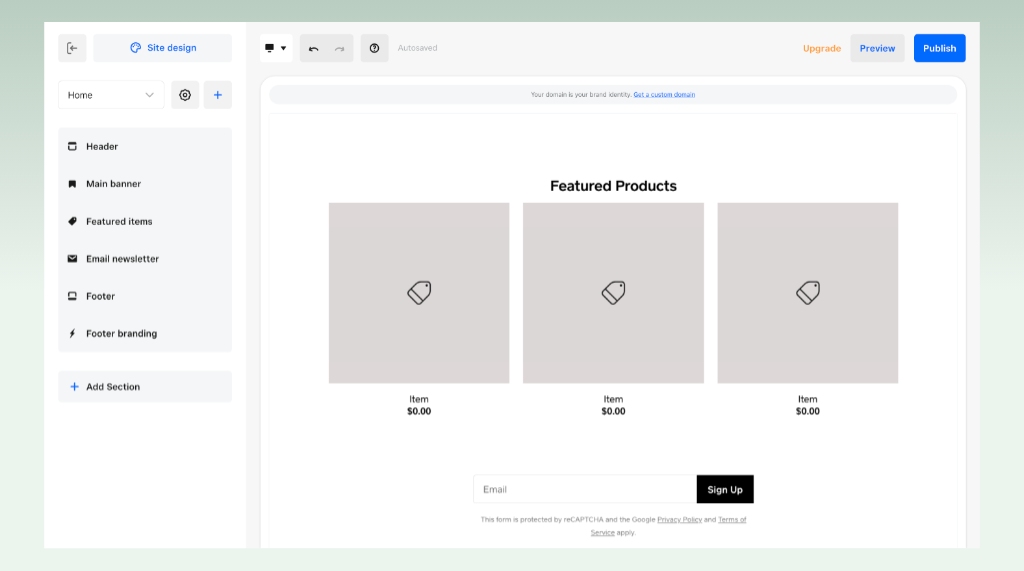
Between Weebly vs Shopify, Weebly is more exceptionally user-friendly. It offers simplicity for beginners and those looking for basic website or online store functionality. Alternatively, Shopify offers powerful tools for managing and scaling your online stores.
Our verdict: Weebly may be preferred for beginners and simplicity, while Shopify is the winner for those seeking a robust eCommerce platform.
>>> Learn more: Shopify vs Wix 2023: Finding your online store’s perfect match
2.4. eCommerce features: Weebly eCommerce vs Shopify
| eCommerce Features | Shopify | Weebly |
| Online Store | Integrate products to sell on Amazon, eBay, Facebook Shop, and Instagram shoppable posts. | Standard online store functionality. |
| Management of Products | Detailed product adding and management interface. | Simple and minimalist item management interface. |
| Sales Channels | Integrate products to sell on Amazon, eBay, Facebook Shop and Instagram shoppable posts. | Only support Instagram shoppable posts; Not integrate products for sale on Amazon, eBay, and Facebook Shop. |
| Analytics | Basic insights and visitor statistics from the dashboard. Integrated with Google Analytics. | – Basic insights and visitor statistics from the dashboard. – Integrated with Google Analytics. |
| Checkout Capacity | Allows more shoppers to check out simultaneously. | Standard checkout capacity. |
| Abandoned Cart Recovery | Abandoned Cart Recovery feature available for all plans. | Abandoned Cart Emails available for Performance plan. |
| Management of Physical, Digital, Dropship, and POD Products | – Handles products with variations, organizes items into categories, tracks inventory, and supports custom goods. – Supports dropship vendors with a wide range of service providers. – Supports more POD providers. Supports digital products. | – Handles physical and digital products, and supports dropship vendors via integrated apps. – Integrates with Printful for POD. – Supports digital sales. |
The Shopify-based Aloha website has a more detailed product page with many conversion-boosting features, such as product reviews, variants, upsell popups, and combo recommendations:
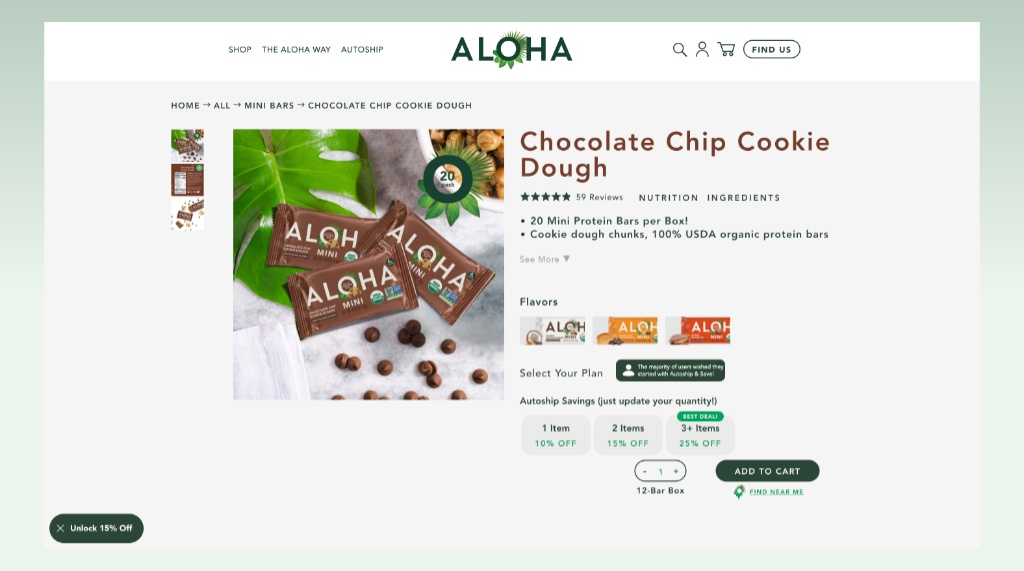
The Weebly-based website Ryan Jewellers has a simpler product page with basic features, including sales off, product description:
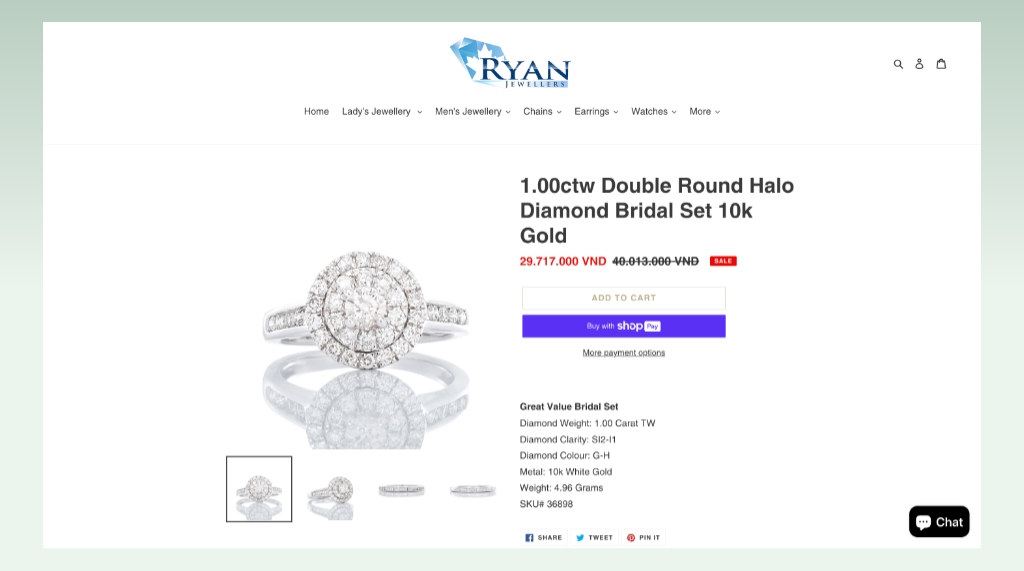
When it comes to eCommerce features, Weebly is simpler, which makes it suitable for small businesses looking for a straightforward online presence.
On the contrary, Shopify excels at providing powerful eCommerce features. This platform is ideal for businesses with long-term growth goals and an enormous product catalog.
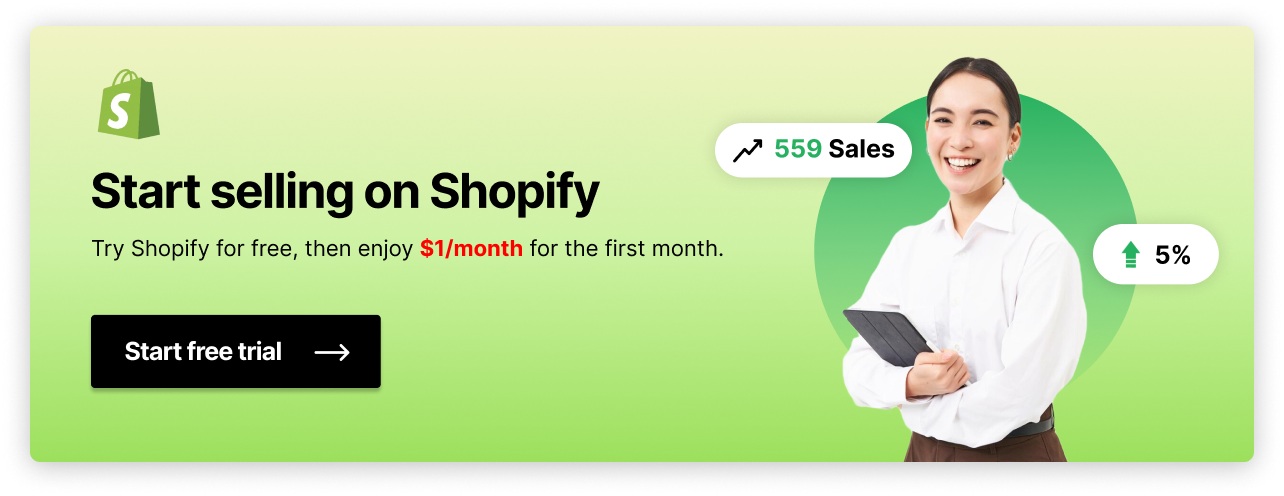
While Weebly offers basic eCommerce functionality, Shopify stands out with advanced tools such as multi-channel integrations, customizable checkout pages, abandoned cart recovery on its cheapest plan, and support for various payment options.
Our verdict: In a comparison between Weebly eCommerce vs Shopify, Shopify emerges as the winner for advanced eCommerce functionality.
2.5. Marketing tools
| Marketing Features | Shopify | Weebly |
| Email Marketing | – Built-in Shopify Email tool. – Ready-made email templates. – Up to 2,500 emails per month for free. – Multi-channel marketing campaigns on different platforms. | – Weebly Promote for email marketing. Intuitive email maker with customizable templates. – Limited to 2 campaigns and 500 emails per month in the stock version. – Requires premium version for full features ($72/month). |
| Email Marketing Pricing | Up to 2,500 free emails/month, with a $1 fee for an extra 1,000 emails sent out. | A separate pricing structure ranging from $8-$75/month, depending on the plan and features required. |
| Campaigns and Marketing Integration | – Campaigns feature for setting up marketing campaigns with specific goals. – Extensive marketing integrations. | – Focus on email marketing. – Limited information on broader marketing integration capabilities. |
| Blogging Tools | Basic blogging tools with ready-made templates. | Comprehensive blogging tools with features like archive, social bookmarking, and search. |
| SEO Features | – Customizable URLs, meta descriptions, and alt tags. – Automatically generates a sitemap. – Headings available up to H6. | – Customizable URLs, meta descriptions, and alt tags. – Automatically generates a sitemap. – Additional feature for adding 301 redirects when a page URL changes permanently. – Headings available up to H2. |
| Third-party Marketing Apps | Extensive app marketplace with 1,307 third-party marketing apps. | – Limited information on the number of third-party marketing apps. – Mention of 56 third-party marketing apps. |
Shopify has its own email marketing tool called Shopify Email, which allows you to send up to 2,500 free emails per month. Conversely, Weebly’s email marketing platform, Weebly Promote, is notable for its customization and creation options.
Weebly focuses on email marketing, comprehensive blogging tools, and on-page SEO control. Additionally, the price for Weebly email marketing seems more straightforward, with individual plans ranging from $8 to $75 per month, depending on the features required.
In contrast, Shopify has a large app market with 1,307 third-party marketing apps. It provides users with many options for more marketing capabilities.
Our verdict: Shopify wins for advanced marketing capabilities.
2.6. App & integrations
| Apps and Integrations | Shopify | Weebly |
| Number of Apps | 8,000+ apps available on the Shopify App Store. | Just around 400 apps available on the Weebly App Center. |
| Categories and Variety | – Extensive variety covering eCommerce, Marketing, Social Media, and more. – 1,300+ apps for marketing alone. | – Various categories: eCommerce, Marketing, Social Media, and others. – Limited marketing apps in comparison to Shopify. |
| App Discovery and Navigation | Easy navigation with filtering options by category, price, popularity, and search bar. | Intuitive and immersive app center for faster discovery. Apps are well-categorized, making it easy to find services. |
| Free Apps | 3,000+ apps have a free version. | Nearly 60 free apps available. |
| Premium Apps Pricing | Prices vary from $3 to $1,500 per month. | Prices vary between $3 to $300+ per month. |
| App Installation Process | – Allow to install apps through the Shopify App Store, third-party install link, or install a custom app. – Most apps provide walkthroughs for the installation process. | – Apps are integrated directly into the Weebly platform. – Some premium apps may require payment or activation steps for full functionality. |
Shopify app store
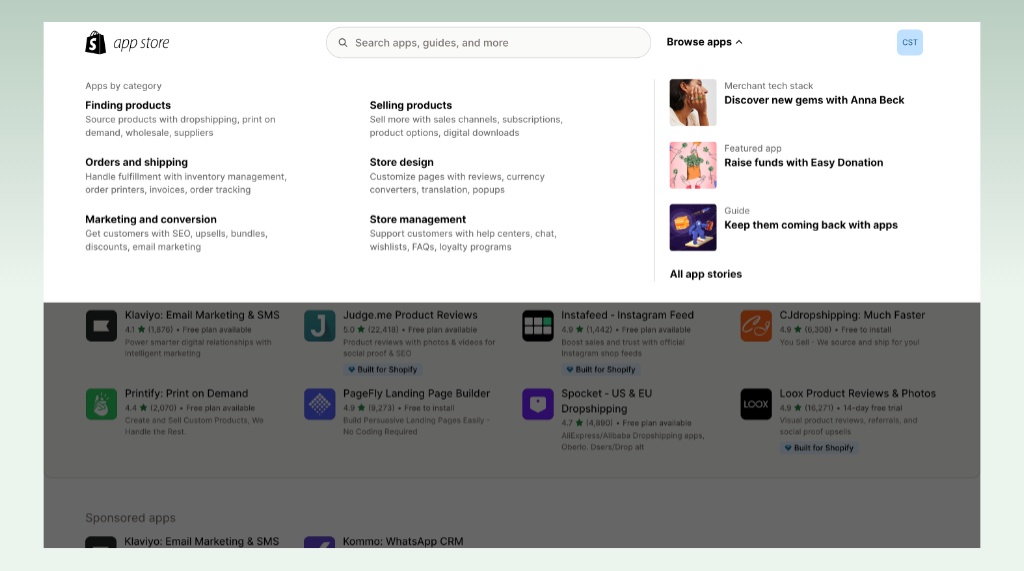
Weebly app center
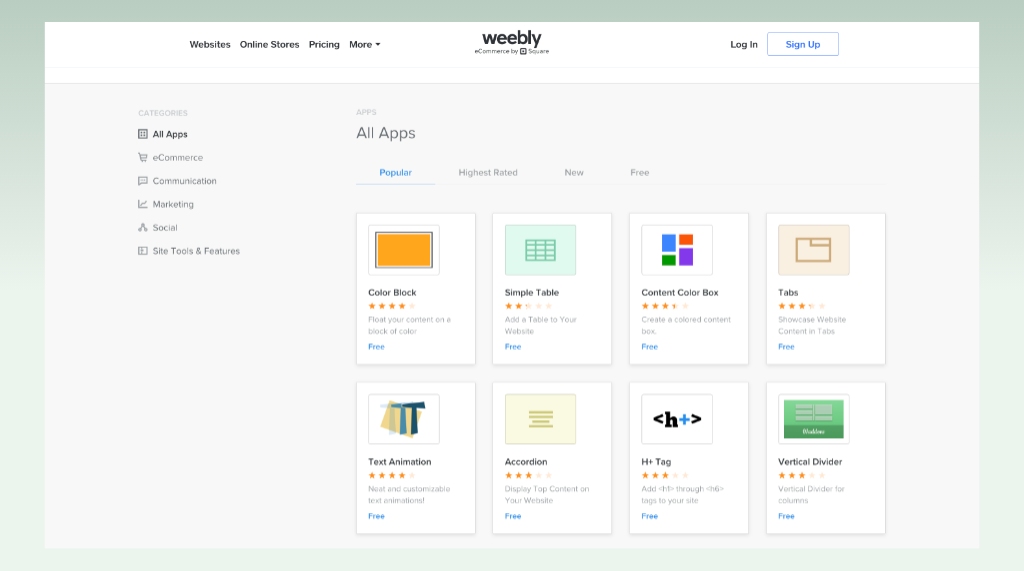
Shopify is dominant, with an extensive app store that includes over 8,000 apps. The Shopify App Store covers a wide range of categories, from product sourcing, store building, and conversion optimization to sales facilitation.
With a respectable app center including around 400 apps, Weebly needs to catch up compared to Shopify. The Weebly App Center also covers essential categories but not all of Weebly’s apps are designed for eCommerce purposes; instead, the platform primarily focuses on blogging and website-building functionalities.
Our verdict: Shopify wins for extensive app and integration options.
2.7. Scalability
| Scalability | Shopify | Weebly |
| Platform Scalability | Scalable for eCommerce stores of all sizes. | – Scalable for small to medium size businesses. – May have limitations for large-scale enterprises. |
| Ease of Scaling | – Easy to scale with a variety of plans and features to accommodate growing businesses. – Ability to handle high-volume sales. | – Relatively easy to scale for small to medium-sized businesses. – May face limitations for large enterprises or high-volume sales. |
| Enterprise Solutions | – Offers Shopify Plus, an enterprise-level solution with advanced features. – Trusted by major brands and high-volume businesses. | – Do not provide many advanced features for enterprise-level solutions. – Focused on catering to the needs of small to medium-sized businesses. |
| Multi-channel Selling | Robust multi-channel capabilities, allowing integration with various online marketplaces. | Supports multi-channel selling but may not have the extensive integrations found in Shopify. |
| Flexibility and Customization | – Highly flexible with a wide range of themes, apps, and customization options. – Suitable for diverse industries and business models. | Not flexible for extensive features and options available in Shopify. |
One of Shopify’s most noticeable strengths is its highly scalable platform, which makes it suitable for businesses of all sizes. Weebly, on the other hand, has some limitations when it comes to large-scale enterprises or high-volume online stores.
Our verdict: Shopify wins for scalability and business growth.
3. Shopify or Weebly: Who holds the winning hand?
3.1. Pros and Cons of Shopify
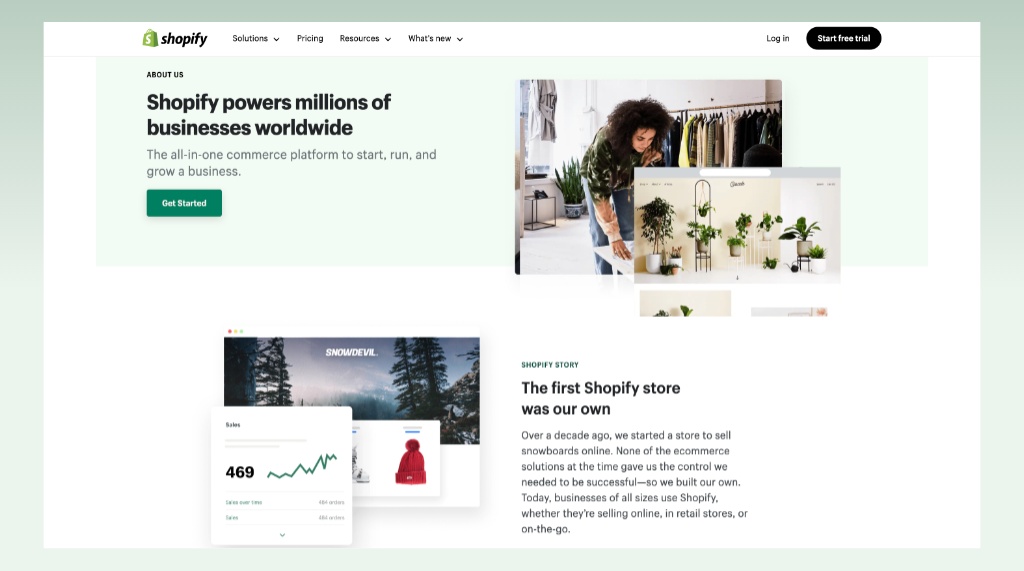
| Pros | Cons |
| – Highly scalable for all-size businesses. – Easy to scale with various plans and features. – Offers Shopify Plus for enterprise-level solutions. – Robust multi-channel capabilities. – Highly flexible with extensive themes and customization options. | – Monthly subscription costs may accumulate. – Learning curve for beginners. |
Choose Shopify if you:
- Seek scalability for small to enterprise-level businesses.
- Need robust multi-channel selling capabilities.
- Prioritize flexibility and customization.
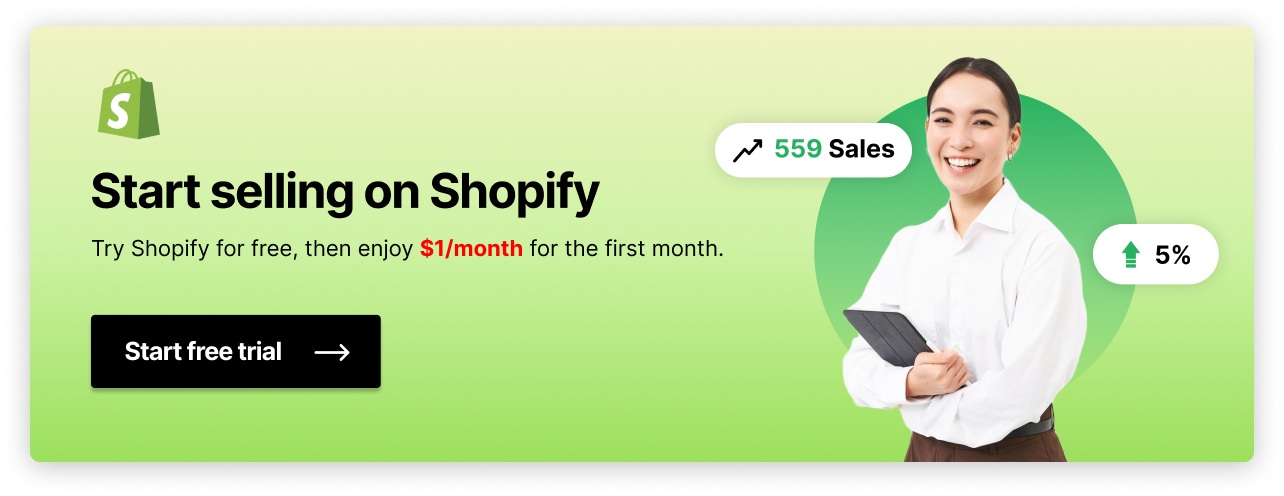
3.2. Pros and Cons of Weebly
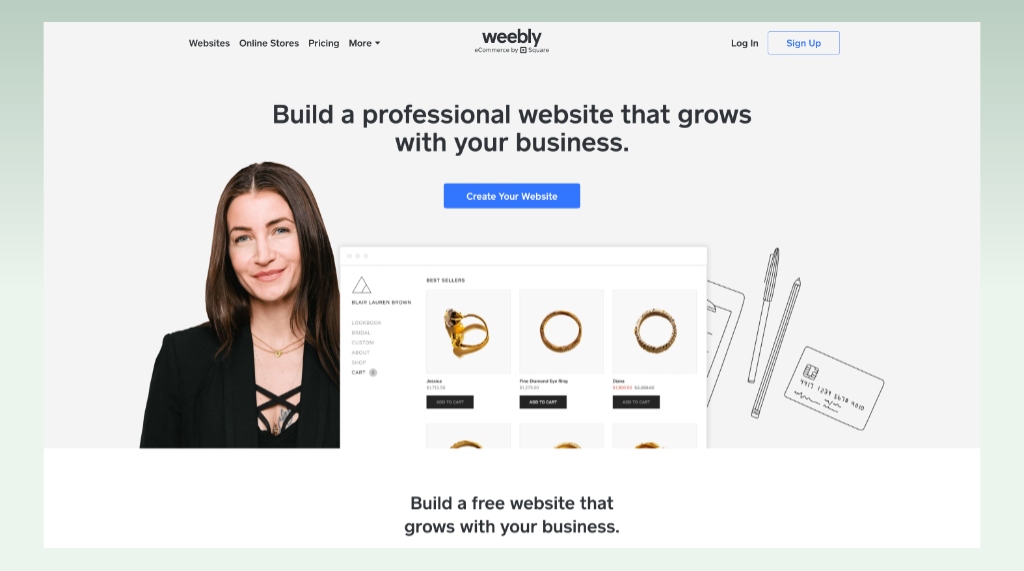
| Pros | Cons |
| – Scalable for small to medium-sized businesses. – User-friendly design with an easy-to-use interface. – Integrated blogging and SEO features. – Competitive pricing with free options available. | – May face limitations for large enterprises. – Fewer app options compared to Shopify. |
Choose Weebly if you:
- Operate a small to medium-sized business.
- Prefer a user-friendly platform with integrated features.
- Seek competitive pricing with free plan options.
3.3. Our verdict
After careful consideration, Shopify is the preferred choice for its extensive scalability, multi-channel capabilities, and flexibility. While Weebly offers user-friendly options and competitive pricing, Shopify’s robust features make it the winning hand for businesses aiming for growth and versatility.
🤔 Thinking of alternatives to Shopify? Explore Shopify vs other eCommerce platforms for a thorough comparison and discover the optimal solution for your online store.
4. Conclusion
In this article, eComStart has thoroughly compared Weebly vs Shopify.
Thanks to its scalability and omnichannel capabilities, Shopify is a formidable choice for businesses of all sizes. This platform is considered a comprehensive eCommerce solution thanks to its flexible pricing, large app store, and Shopify Plus for businesses that need it.
On the other hand, Weebly has advantages thanks to its user-friendliness, built-in blogging features, and competitive pricing. There is no need to deny that it is an excellent choice for small and medium businesses.
In short, Shopify vs Weebly, which one is better depends entirely on each business’s specific needs and aspirations. Whether you love Shopify’s flexibility or Weebly’s simplicity, there’s no denying that both platforms contribute significantly to the eCommerce landscape and contribute greatly to your business success.


